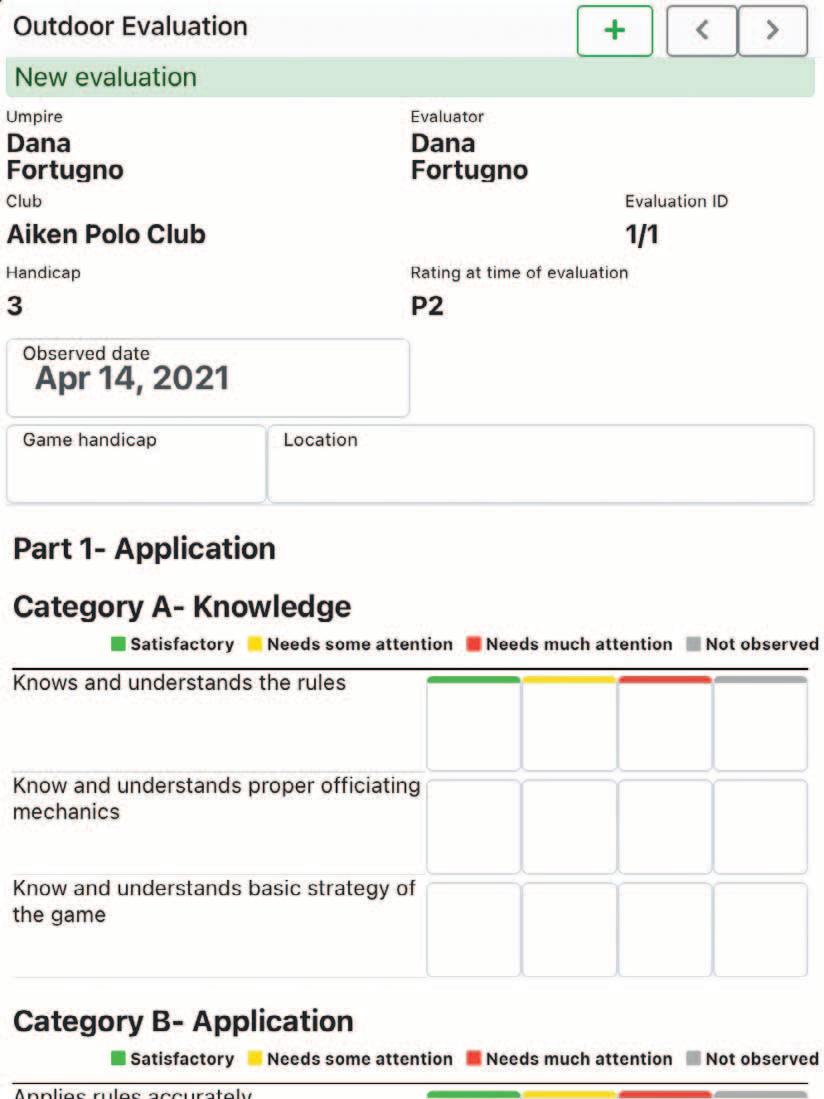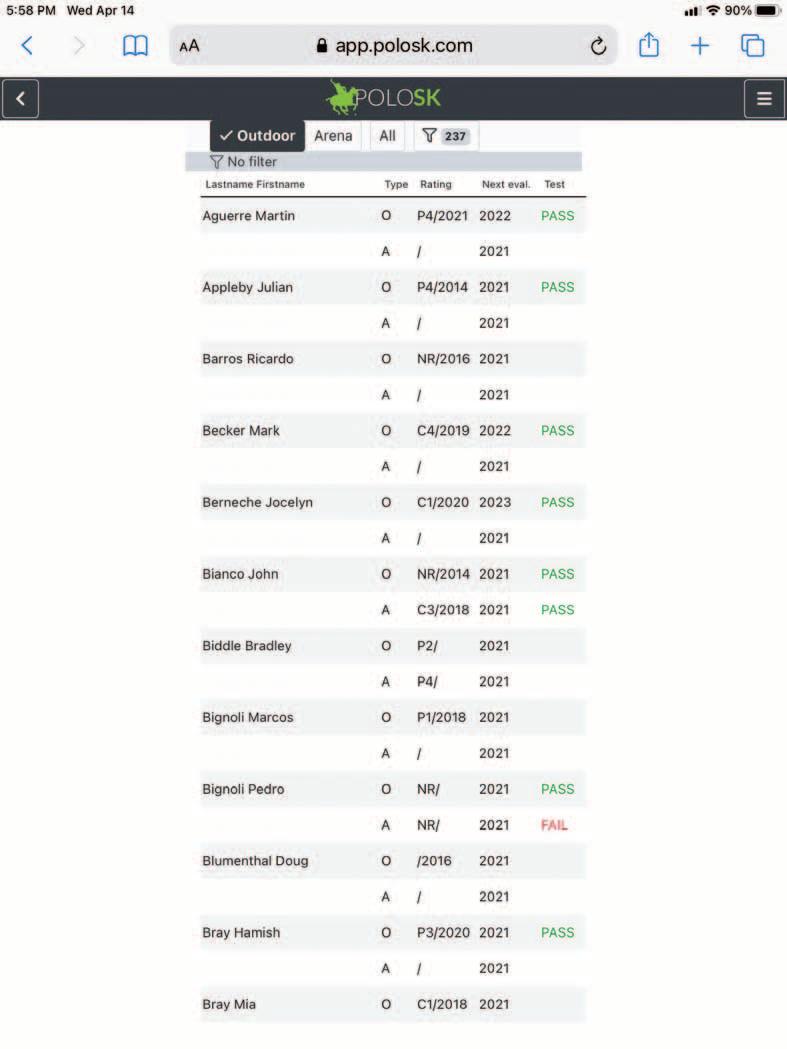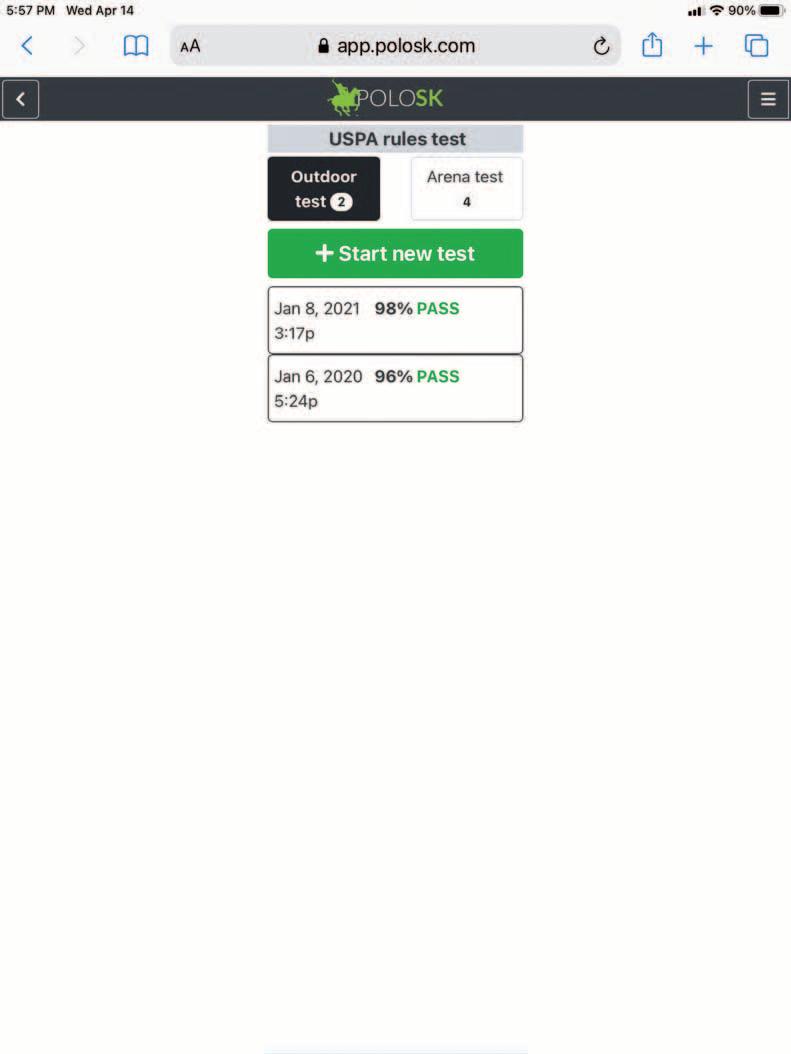
5 minute read
June 2021 Polo Players' Edition - Umpire Certification Process: Tried and Tested
A Look at the Umpire Certification Process
By Dana Fortugno
I am asked about umpire certifications all the time. Many players think we no longer certify umpires—that is simply not true. We do certify umpires. In fact, we certify them all the time and any of our professional umpires can certify. Boom! Who knew? I did.
We are, however, considering some improvements to the certification process and yes, technology is driving these changes. I am going to tell you all about the process—what it was, what we are considering, and how being a USPA certified umpire is different than being a USPA professional umpire.
First, the way it was: Before the shift in Umpires, LLC management, we used paper forms when certifying a club umpire. Only one staff member could certify outdoor umpires, and one could certify arena umpires. We had rules we had to adhere to. For example, umpires would have to be evaluated every three years or they would no longer be certified (we had to keep track of this).

Umpires had to pass the rules test, of course, but we could complete the certification forms before they took the test. So, many umpires were observed umpiring on the field but only a few took the test. We had to somehow figure out who did not take the test and separate them out. By the way, the test answers were floating around out there as a PDF file and players used this to cheat on the test (an open book test). Who cheats on an open book test with no time limits? Polo players do. I heard a rumor that one polo mom (of a very notable polo family) would take the test for all the young players in her house—nice example, mom. Those players never learned to navigate the rule book, so I guess they can just call mom if they have an issue on the field.

Then, we had to store the paperwork and manually keep up with hundreds of forms and no system to categorize and search them. It was a mess. That is the history, and I am happy to leave it in the past. It is an understatement to say that we have come a long way. We now focus on doing a great job, killing our mission with innovation and enthusiasm (instead of trying to just keep our jobs by staying under the radar, so to speak). Yup, I said that and it’s true.
Second, as promised, here are some changes we are considering making and why. We had to solve the following problems before we could begin with a new policy: players cheating on the test; observed umpires not taking the test; storing the certification forms; searching the certification forms; and keeping up with re-certifications. That’s a tall order.
We discovered an App called PoloSK, created by Jocelyn Berneche, a polo player and IT code writer (what a combination). We worked with Berneche to solve these issues and more. We use the App now. What does that mean? It means all our problems with certifications are now managed and solved for now. We now have all 25 of our umpires able to certify club umpires. They log into the App and if the club umpire has not taken and passed the test, the App will not allow us to certify them.

The rules test is now on the App as well, and the questions are randomly generated from a pool of questions, so each test is unique. We are considering making that test shorter and easier for club umpire certifications. If you fail, you can take it again (but it is a different test each time). Good luck cheating on this one. The App stores the certification form and reminds us when it is time to re-certify that club umpire. Yup, no more paper, easily searchable and it’s linked to the USPA database so it is always up-to-date. It won’t even let us certify umpires that have not paid their dues. It does all that and much more.
Lastly, what is the difference between a USPA certified umpire and a USPA professional umpire?
We have about 25 or so professional umpires. These guys and gals are trained and supported like no other program. It is truly impressive. We are outdone by NASA and SPACEX supporting their astronauts but nobody else—not even the police offer this level of support (I know).
We have umpire-only web pages that are full of videos, rules updates, charts and so forth. We give them quick reference guides and pregame study materials; we have meetings and more meetings; we pass around videos; we provide radios, go pro cameras and replay iPads; and the best part is there are four of us on call all the time for emergency questions (not life and death emergency—polo emergency, the most important kind).
I was told that the rule book reads just fine, and the umpires are professionals so they should be able to keep up. I took that comment to the bank and our umpires are doing well—very well. Now, that is for professional umpires that we pay and can require them to keep up. A club umpire does not have to keep up with everything (rules changes, interpretation changes and so forth). In fact, unless you are getting paid, nobody can keep up and I mean nobody! I have seen proof.
It would be unfair to ask a club umpire, who has another normal job, to do all the things we require our professional umpires to do. It is just too much for them. So, we are hesitant to put our umpire stamp on club umpires without requiring them to do the impossible.
Instead, we are considering certifying them with “CU” meaning club umpire. This would mean they passed the written test and have been observed by one of the umpires to ensure they have a basic understanding of the rules and the game. They can then umpire at whatever level they are accepted by a club. In other words, their personal umpire reputation and handicap will determine what level a club asks them to umpire. We do not want to take responsibility for them, but they can for themselves.

This way, we certify club umpires but we do not endorse them. They can make mistakes and that is on them, on their personal reputation, not ours. If one of our umpires makes a mistake that could have been avoided with our support, they get fined or terminated because it is our collective reputations now on the line. That is big difference.
We think these changes will work better for everyone under the current complex and everchanging rules. We will keep you updated once these decisions are made.










